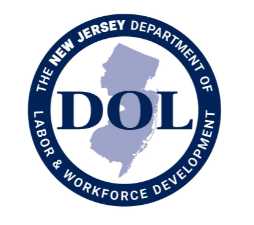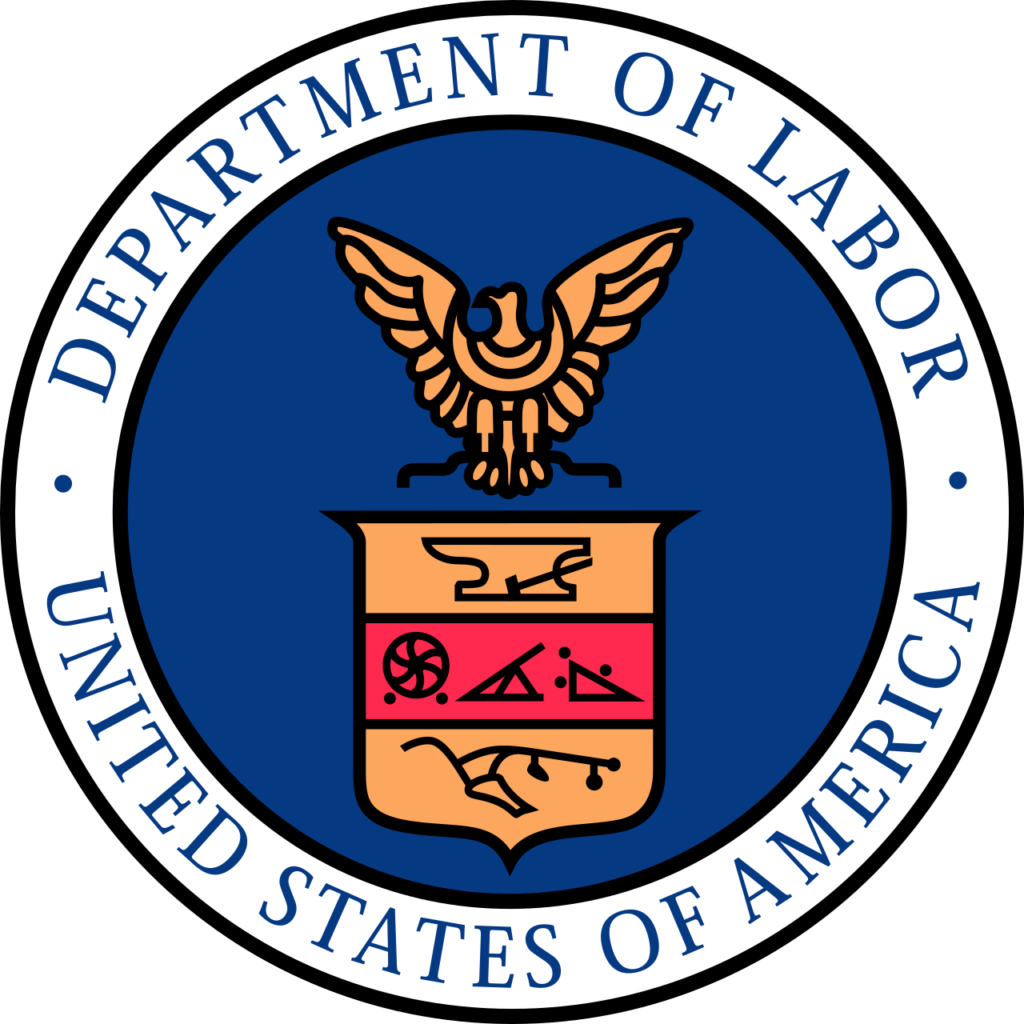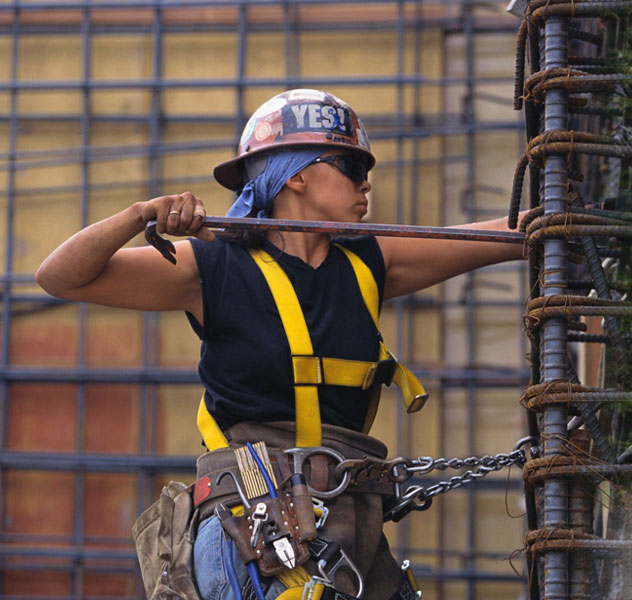
FHWA is promoting Strategic Workforce Development in highway maintenance, construction and operations.
Strategic Workforce Development, an FHWA Every Day Counts (EDC) Round 6 innovative initiative, anticipates collaboration between government agencies, trade organizations, private agencies and communities to prepare individuals for the construction workforce. The demand for workers in highway maintenance, construction and operations is growing, as is the demand for new skill sets required for work with emerging technologies. An important element of this initiative is the recruitment and retention of women and minorities in the construction sector. Through on-the-job training and supportive services program, NJDOT is exploring ways to work with contractors, contracting associations, and unions on shaping their future workforces, including programs aimed at increasing representation of women, minorities, and other disadvantaged populations in the construction and operations workforce.
We spoke with Nick Toth, Director, New Jersey Office of Apprenticeship, NJ Department of Labor and Workforce Development (NJDOL) to learn about the State’s role in funding, promoting, and providing technical assistance for on-the-job training programs, and pre-apprenticeship and apprenticeship programs, to support all workers including women, minorities and other disadvantaged individuals seeking to enter highway construction and other related fields.
Background
Q. Can you tell us a little bit about your role in the Office of Apprenticeship at the New Jersey Department of Labor and Workforce Development?
I am the director of the New Jersey Office of Apprenticeship in the Department of Labor and Workforce Development. I was hired into this position to develop the first Office of Apprenticeship. In 2018, Governor Murphy announced the New Jersey Apprenticeship Network to invest in pre-apprenticeship and apprenticeship programs throughout the state. We developed a host of grant programs and have grown from a staff of one to twelve people. We currently oversee six grants, including two grant programs for the New Jersey Builders Utilization for Labor Diversity (NJ Build) Program that came under our umbrella in the past year. We provide $10-15 million in grants each year focused on supporting pre-apprenticeship and apprenticeship programs in varying employment sectors. The key tenet of our work is to build a stronger and fairer economy with greater equity, inclusion and diversity among participants. We also focus on removing the economic barriers that inhibit access to training.
Q. Our understanding is that NJDOL supports apprenticeship initiatives via grants but that the USDOL manages apprenticeship programs in the state. Is that accurate?
New Jersey operates as a federal state, with NJDOL providing technical assistance, funding, and marketing to support pre-apprenticeships and apprenticeships. However, the U.S. Department of Labor (USDOL) is the registrar for NJ apprenticeship programs. There is no registration process for pre-apprenticeship programs. We work closely with USDOL and we have an employer engagement unit that works closely with NJ employers.
Q. What is the difference between the NJDOL Office of Apprenticeship and the New Jersey Apprenticeship Network?
The New Jersey Apprenticeship Network is a broad initiative focused on building partnerships and developing relationships to provide employment opportunities for New Jerseyans in a wide array of sectors. The Apprenticeship Office is part of the Network. We partner with employers, whether they are grantees or not, and we partner with other organizations.
Q. NJDOT is focused on recruiting and retaining workers in the highway construction industry. Based on your experience, is there a lack of awareness – especially among women and minority persons – for jobs and careers in the highway construction industry? If so, do you know of programs that are building awareness for opportunities in transportation?
In general, there is a lack of awareness of what apprenticeships are and the opportunities available to workers. There is also a communication gap, both statewide and nationwide, related to the skilled trades. There is no solid messaging or awareness about the economic benefits of pursuing a trade or following a non-college path. I have not seen a concerted public awareness effort directed to women and minorities. But there’s a real economic argument to be made for apprenticeship programs. If you go through a structured apprenticeship program, you will experience hands-on training and receive a paycheck throughout the program. Some of these programs are four years and you will exit without any student loans. It is vital to better communicate and increase awareness among employers and prospective employees that apprenticeships are very different from internships.
Q. Several commonly cited roadblocks to entry into the construction sector, particularly for women and minority candidates, include transportation issues and childcare. What strategies could help to address these issues?
I can confirm that transportation and childcare are the two most common barriers that are at the front of the discussion. For most of our grants, including the GAINS, PACE, and NJ PLACE 2.0 grants, budgeting for supportive services includes transportation and childcare as permissible uses of funds. Where our Office has leverage is in how we prescribe the way state funds can be used; we try to incentivize applicants to include this support for program participants as part of their application.
Q. Does your Office play a role in helping to reduce barriers for women, minorities, and others in entering the highway construction trades? Also, we saw on your website that NJDOL has posted a notice of grant opportunity (January 31, 2022) called, “Women and minority groups in construction trades program.” Can you please tell us about this grant opportunity?

NJ Build Program grants are available to contractors in the construction and building trades and provide access to women and minorities to training.
This grant opportunity is a NJ BUILD Program effort that has been available for a decade. Unfortunately, we receive low response rates to these grants which seem to be “the best kept workforce development secret,” as it can be difficult to get the word out to contractors and construction companies that are open to diversifying their workforce.
Any state agency can also apply for this grant and it is specifically written to provide access for women and minorities to apprenticeships or pre-apprenticeship training. The NJ BUILD grants are limited to the construction and building trades because of the way they are funded. By statute, a fee is assessed on public works contracts with a value above $1 million and these funds must be used for training of women and minorities in the field that is paying into that fund.
Q. We have heard that pre-apprenticeship programs are growing in popularity across the country and that NJ has the Pre-Apprenticeship in Education (PACE) program. Can you tell us about PACE and if the program focuses at all on highway construction trades in NJ?
What are essential elements of a pre-apprenticeship program to help women, minorities, and others enter an apprenticeship program? Are there programs that offer a direct connection between pre-apprenticeship and apprenticeship programs?
With all our apprenticeship grants – everything outside of NJ BUILD – there is no specific focus on highway construction, but highway construction would fall under the heading of infrastructure. We would love to fund a workforce development program for those jobs, considering the federal dollars that will be coming to the state from the new federal infrastructure bill.
It is important to link pre-apprenticeship programs with apprenticeship programs so you don’t lose people between these programs. For example, in order to be eligible for a PACE grant – which is focused on high growth sectors including infrastructure – you have to have one established partnership with a registered apprenticeship program. We provide placement metric requirements to track how many pre-apprenticeship participants move to the apprenticeship program. But we also offer two other “off-ramps,” since sometimes not all participants will be able to move on to the apprenticeship, for example, if you have trained 50 people but your partner can only take 15 into their program. If participants go on to a job, a post-secondary program or career training program at a higher level, we count that as a good outcome as well.
Q. Are you aware of any model practices currently among community-based organizations to support women, minority, and others looking at the construction trades?
I use healthcare as an example. We have made significant headway in the number of women participating in registered healthcare apprenticeships, which has doubled from 6 percent to 12 percent. Some programs are over 90 percent women, with many minority participants.
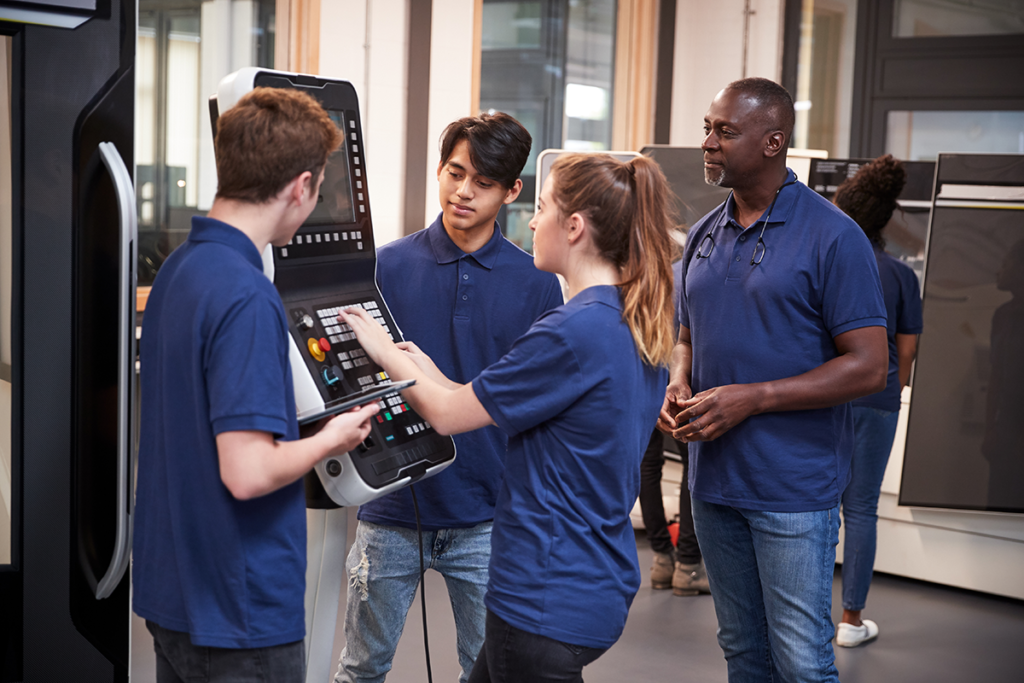
Preparing students for jobs in the skilled trades is a good strategy to provide employment opportunities for all.
Generally, there is less interest among job seekers in the building trades. Thirty years ago, pursuing a career in construction would have been considered on par with going to college, but we have changed a lot as a country.
From a union perspective, it would be great to see a more concerted effort to diversify union membership. But I understand that when you target economically depressed communities, there are existing barriers that inhibit people from applying. The unions need a qualified applicant pool. So, focusing on pre-apprenticeships and apprenticeships as a pipeline into the sector and building awareness among young adults in high school for careers in trade are valuable strategies. In addition, raising awareness for career opportunities in construction overall and to targeted audiences is also needed. High schools are not preparing students for jobs in the trades, but rather emphasize college placement, so there are structural issues contributing to the problem.
NJDOL Grant Initiatives
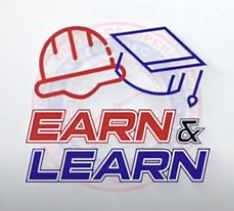
The Earn & Learn collaboration between HCCC and IUOE Local 825 is funded through a NJ Place 2.0 grant.
Q. The "Earn and Learn" program developed between the International Union of Operating Engineers (IUOE) Local 825 and Hudson County Community College (HCCC) is supported with a NJ PLACE 2.0 Degree Apprenticeship Program grant. Our understanding of this innovative program is that its aim is to integrate work-based learning with post-secondary education, allowing apprentices to earn college credits and an apprentice wage simultaneously. Are both four-year and community colleges participating in this program? Can grantees apply for continuing funding after their initial award is spent?
The genius of the NJ PLACE 2.0 grant program is that participants simultaneously earn course credit and a paycheck via this grant that incentivizes four-year and community colleges to collaborate with organizations that have a registered apprenticeship program. Participants pursue an Associate’s degree while being paid for on-the-job training.
If a grantee’s program is doing well, they could be eligible for additional funding. Ultimately, the goal of the Office is to distribute these grant dollars to applicants with promising initiatives designed to integrate work-based learning with post-secondary education.
Q. Another initiative that your Office oversees is the GAINS, or Growing Apprenticeships in Nontraditional Sectors, program. Our understanding is that GAINS is focused on training youth, adults, and incumbent workers by developing apprenticeship programs in a wide variety of in-demand fields. Is that accurate? For how long have you been distributing these grants?

The GAINS program focuses on in-demand fields and the hiring of women, minorities, and other underrepresented groups.
GAINS is our flagship grant program and the first one I worked on when I came into this job. As noted, it is focused on developing apprenticeship programs in fields that are in demand. We are in our fourth program year for this annual grant. We will soon announce a $3 million funding round and will probably have another round later in the fiscal year. We have had a good uptake in the program. This round we will fund apprenticeships in nursing residency, wastewater treatment, massage therapy, electrical, cybersecurity, and for machinists, home health aides, computer systems analysts, and ironworkers. We encourage all of our applicants to hire from diverse groups and our application evaluation criteria are based on inclusion of people of color, people with disabilities, women and veterans.
Q. How do you ensure compliance with these inclusion goals?
Registered apprenticeships are tracked through a national database. We require monthly reports from our grantees. The staff in the contracting unit validate the level of service.
Looking Ahead
Q. What strategies should be pursued to encourage more New Jerseyans to consider a career in the highway construction industry? Who should be leading or involved in those efforts?
Implementation of awareness campaigns, job fairs, rapid interviews, and events to learn about these careers can be effective. If NJDOT has openings, they can let NJDOL know. We can then reach out to the local One-Stops to request they send out an email blast statewide or to a particular geographic region alerting folks of these DOT job opportunities. We have done this for our grantees. If NJDOT has job openings, they can also advertise through the One-Stop Centers, and share eligibility requirements.
NJDOT should also engage in conversations with the contractors who are seeking workers for NJDOT contracts. The state has leverage in the contract requirements when contractors receive state dollars. Under a new law, which has been in effect the last two years, every contractor that has a public works certification, must participate in a registered apprenticeship program. In their procurement language, NJDOT can require the contractor to train their workers, or develop apprenticeships to pipeline people in, or partner with their local One-Stops, or include a local hire provision. Including these requirements can drive positive behavior among employers that can help to diversify the workforce.
Q. Through their on-the-job training and supportive services program, NJDOT is exploring ways to work with contractors, contracting associations, and unions on shaping their future workforces, by focusing on training and recruitment programs aimed at women, minorities, and others. Do you have any thoughts about how NJDOT might pursue this goal? How could NJDOT partner more closely with your Office?
We had productive conversations with NJDOT when I came on the job, and I discussed our apprenticeship grants with them. NJ BUILD was not in my purview at the time. Our NJ BUILD programs are tailor-made for NJDOT. Philosophically, our two departments are aligned in wanting to accomplish the goal of having a more diverse workforce. NJDOT should definitely consider applying for some of our available grants as they are eligible to do so and we can cover some of the operational costs associated with the grants in some cases, including staffing costs. There’s a lot of opportunity there and it could be a win-win for NJDOT.
"Our programs are tailor-made for NJDOT. Philosophically, our two departments are aligned in wanting to accomplish the goal of having a more diverse workforce."
My team and I love to get in front of groups of NJ employers to discuss our grant opportunities. We have lots of mutual goals for increasing successful job recruitment and the diversity of the labor supply, none of which can occur without conversations with the employers. I’d be happy to spend time discussing NJ BUILD opportunities with construction companies that are already contributing to the state through the public works contract fee and with NJDOT, to share how our Office can support the training and upscaling of their workforce.
Resources
Federal Highway Administration, Every Day Counts Round 6, Strategic Workforce Development. https://www.fhwa.dot.gov/innovation/everydaycounts/edc_6/strategic_workforce_development.cfm
Hudson County Community College, Workforce Development. https://www.hccc.edu/programs-courses/workforce-development/index.html
International Union of Operating Engineers, Local 825. Earn and Learn Program. http://www.iuoe825.org/
NJ Department of Labor and Workforce Development, NJ PLACE 2.0 Grants. https://www.nj.gov/labor/lwdhome/press/2020/20200131_njplace.shtml
NJ Department of Labor and Workforce Development, Office of Apprenticeships. https://www.nj.gov/labor/career-services/apprenticeship/
NJ Department of Labor and Workforce Development, NJ Builders Utilization for Labor Diversity (NJBUILD), Women and Minority Groups in Construction Trades. Notice of Grant Opportunity, Fiscal Year 2022


